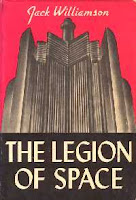
One of the first, if not the first science-fiction novels I read, I unequivocally love this one, and if it has any flaws I fail to see them.
The novel begins with an introduction that, though largely disconnected from the rest of the novel, introduces the future world and imparts a sense of size and magnitude quite more successful than similar attempts in other novels:
“I was still falling, all right. I was in the same position—but no longer on the Earth.
All around me was a weird plain. It was blazing with a glare of light, pitted with
thousands of craters, ringed with mountains higher than any I had ever seen. The Sun
was burning down out of a blue sky dark as midnight, and full of stars. There was
another body in the heavens, huge and greenish.
“A fantastic black machine was gliding down over those terrible mountains. It was
larger than you’d think a flying machine could be, and utterly strange. It had just hit
me with some weapon, and I was reeling back under the agony of the wound. Beside
me was a great explosion of red gas. The cloud of it poured over me, and burned my
lungs, and blotted out everything.
“It was some time before I realized that I had been on the Moon —or rather that I had
picked up the last thoughts of a man dying there. I had never had time for astronomy,
but one day I happened to see a photograph of the lunar craters—and recognized
them, and knew that the greenish crescent had been the Earth itself.
“And the shock of that discovery only increased my bewilderment. It was nearly a
year before I understood that I was developing an ability to recall the future. But that
first incident happened in the thirtieth century, in the conquest of the Moon by the
Medusae—the man whose last moments I shared was one of the human colonists they
murdered.
“The faculty improved with practise, like any other. It’s simply telepathy, I’m
convinced, carrying thought across Time and not merely through Space. Just
remember that neither Space nor Time is real; they are both just aspects of one reality.
“At first I got contact only with minds under great stress, like that of the dying
colonist. Even yet, there are difficulties—or I shouldn’t have asked you to examine
me this morning, Doctor. But I’ve managed to follow human history, pretty well,
through the next thousand years. That’s what I’ve been writing.
“The history of the future!"
This is John Delmar talking to the narrator of the prologue, his doctor. He then goes on, giving a synopsis of the future of humanity and its expansion in space, were his descendants play an important role, up to the year 3000; there, the novel actually begins, in third person and the style you would expect in a 1930's science fiction novel--but a lot better.
Even though I like the writing in the Lensman series, which is often held up as the finest specimen of this kind of novel, it doesn't compare to Williamson, whose prose is cleaner, livelier, and his ideas quite more wonderful.
John Star, hero of the novel, graduates from the academy of the Legion and receives his first mission; there is a beautiful girl involved, with a deadly secret; interstellar adventure, escape from prison, survival on a hostile alien planet, interstellar war, etc. I don't want to spoil anything in the book, it's one of the finest "sense-of-wonder" adventure stories of all time. I'd even go as far as to advice you not to read the backcover if you buy it; it will be much more enjoyable this way.
As far as the sequels go, I tried the second one (the cometeers) but for some reason couldn't get past the beginning. I will definitely read them in the future when I have them all.





















